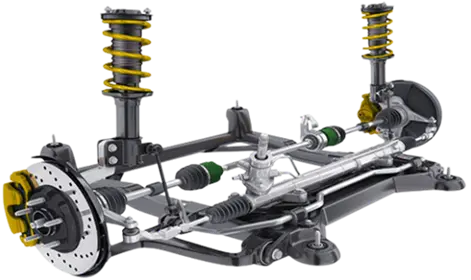Car Ball Joint Replacement – Everything You Need to Know for a Smoother Drive
Are you hearing clunking noises from your car’s front end or feeling loose steering when turning? These are common signs of a worn ball joint — a critical part of your suspension system. A quick and professional Car Ball Joint Replacement can restore smooth handling, improve safety, and prevent costly suspension damage down the line.
Ball joints act as pivot points between the control arms and the steering knuckles, allowing your wheels to move with the suspension while maintaining control. When they wear out, your car may become unstable, pull to one side, or wear out tires unevenly. Replacing damaged ball joints ensures proper wheel alignment and safe driving, especially during turns and braking.

What Is a Ball Joint in a Car?
A ball joint is a spherical bearing that connects your vehicle’s control arms to the steering knuckles. It acts like a pivot, allowing smooth movement in all directions while supporting the vehicle’s weight and absorbing shocks. Ball joints are essential in front suspension systems and enable the wheels to move up and down and side to side simultaneously.
Depending on the vehicle design, some ball joints are serviceable (replaceable), while others come integrated with the control arm and require complete arm replacement.
Why Ball Joint Replacement Is Important
Ball joints are critical components in the steering and suspension system. When worn out or damaged, they compromise safety by affecting your car’s ability to steer, handle, and stop effectively.
Replacing a bad ball joint ensures:
Safe and accurate steering
Stable suspension alignment
Reduced tire wear
Noise-free and smooth driving
Avoiding total joint separation, which can be catastrophic
Ignoring the need for a ball joint replacement could lead to total failure — where the wheel detaches from the suspension system — risking both your life and your car.
Symptoms of a Bad Ball Joint
How can you tell if a ball joint is failing? Look for these warning signs:
Clunking or knocking noise from the front wheels (especially over bumps)
Uneven tire wear, usually on the inner or outer edges
Loose or drifting steering
Excessive vibration from the front of the car
Vehicle pulling to one side
Squeaking noise while turning or braking
If these signs appear, it’s time to visit a trusted Car Suspension Repair Workshop for inspection.
What Causes Ball Joint Failure?
Driving over potholes or rough roads
Corrosion or dirt infiltration
Lack of lubrication in older models
Overloaded vehicle suspension
Types of Ball Joints
Upper Ball Joints – Found on double wishbone suspensions
Lower Ball Joints – Common in most cars; handle more load
Front Suspension Ball Joints – Most frequently replaced
Rear Suspension Ball Joints – Found in advanced or multi-link suspensions
Ball Joint Replacement Process
When you visit a car suspension specialist, they follow a step-by-step process:
Suspension Inspection
Technicians check the ball joints for excessive play, torn rubber boots, and dry movement.
Component Removal
If the ball joint is press-in, it’s removed using a hydraulic press. If it’s integrated with the control arm, the entire control arm may be replaced.
New Ball Joint Installation
The replacement part — OEM or aftermarket — is installed with high-precision tools to ensure proper fitment.
Alignment and Testing
Since ball joints affect suspension geometry, a wheel alignment is performed afterward.
Final Road Test
Your car is tested for ride comfort, stability, and steering accuracy.
Ball Joint Replacement Cost
The cost of car ball joint replacement depends on:
Car make and model
Type of suspension system
Whether ball joint is press-fit or part of control arm
Labor time
Quality of parts used
Typical price range:
Single Ball Joint Replacement: AED 400 – AED 800+
Pair (Left + Right): AED 800 – AED 1,600+
Control Arm with Ball Joint: AED 1,200 – AED 2,500+
Wheel Alignment (Post-Replacement): AED 150 – AED 300+
Looking For Car Ball Joint Replacement Near Me?
If you’re hearing clunking or popping noises while turning or feeling loose steering, your car’s ball joints may be worn out. A Car Ball Joint Replacement Near Me is essential to restoring safe and stable handling. Ball joints act as pivot points between the steering knuckles and control arms, allowing for smooth movement of the wheels while absorbing the impact from road irregularities. Over time, ball joints wear out due to high mileage, harsh driving conditions, and general wear, which can lead to poor vehicle performance and safety risks.
Replacing worn or damaged ball joints ensures that your car’s steering and suspension systems function correctly, preventing further issues such as uneven tire wear, suspension noise, and poor handling. If you’re noticing these symptoms, don’t wait for the problem to worsen. Professional ball joint replacement services will restore your car’s stability and make sure you’re driving safely on the road. Look for a trusted car suspension repair workshop near me to get quality parts and expert service.
FAQs About Ball Joint Replacement
How long does ball joint replacement take?
Usually 1 to 2 hours per joint. Integrated control arms may take longer.
Do I need an alignment after replacing a ball joint?
Yes, since ball joints affect wheel angles and suspension geometry.
What happens if I don’t replace a bad ball joint?
The joint may break, causing the suspension to collapse and the wheel to detach.
Can I replace ball joints myself?
It requires specialized tools and experience. For safety, it’s best left to professionals.
Do I need to replace both ball joints at once?
If one is worn, the other is likely close to failure too. It’s wise to replace both sides.
